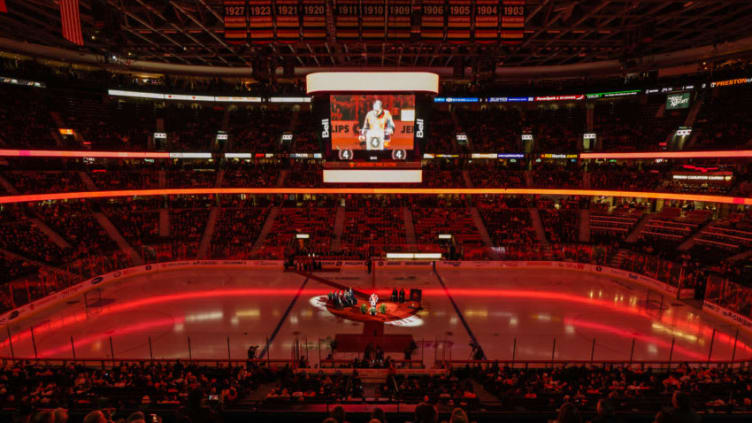Islanders: Re-evaluating cap dump trade to Ottawa Senators

Are the Ottawa Senators still a good target for a New York Islanders salary cap dump?
The New York Islanders need to sign their pending RFAs Mathew Barzal, Ryan Pulock, and Devon Toews. But with little cap space available, the Islanders must find a way to shed some cap space.
With just over $8 million in cap space after the Ilya Sorokin signing, the Islanders aren’t going to have enough room to sign all three RFAs under the $81.5 million cap ceiling. The next natural step is to find teams with cap space who can take on at least one of the Islanders big contracts.
The Ottawa Senators seem like a perfect fit. With $39.595 million in projected cap space for 2020-21, they have room to spare on the cap to take a deal like Johnny Boychuk‘s $6 million deal.
But in today’s economic climate, will Ottawa be wiling to take Boychuk’s deal? And if so how much will it ‘cost’ to make that trade?
Why Boychuk?
Why is Johnny Boychuk a good fit to be traded to the Ottawa Senators?
We know that the Ottawa Senators like to keep their wage bill low. While Johnny Boychuk carries a large $6 million cap hit, his actual payout is much lower than that. Here’s the breakdown of what Boychuk is owed over the final two years of his deal.
*2020-21 signing bonus was already paid on July 1
**After signing bonus
^All $ are in millions
With $5.25 million in total for two years, at a yearly $6 million cap hit, Boychuk’s deal fits with what the Ottawa Senators are doing when it comes to their wage bill. Boychuk’s payout is significantly less than his cap hit.
I spoke with The Atheltic’s Graeme Nichols who covers the Senators about the possibility of a trade between the Islanders and Sens for Johnny Boychuk. Nichols agreed that a fit makes sense. On paper.
The Senators
The Ottawa Senators have a ton of cap space and as Nichols pointed out to me, the Sens have little depth on the right side of the blueline:
Nichols: […] with Ron Hainsey likely moving on as a UFA, the Senators only really have Nikita Zaitsev and the newly signed Artyom Zub who naturally play RD. Although the Senators do have prospect Erik Brannstrom who prefers to play his off-side, the front office and coaching staff have expressed that they believe he’s a better LD.
The Senators have a need for right-handed options on defense. They have cap space to burn with that projected $39.595 million in cap space for 2020-21. They need leadership. The Isles need to shed cap space and need to make room on the right side for Noah Dobson. Sounds like a perfect fit!
But things aren’t that easy when it comes to the Ottawa Senators. As Wayne Scanlan pointed out just recently via Sportsnet, the financial fallout in the NHL from the COVID-19 pandemic hit every team hard but could affect the Senators who held the worst attendance record in the NHL this season a little harder.
That means the Senators might not able to weaponize that cap space like we all assume they will. Nichols agreed, saying that the team has shown they’re more concerned with cutting costs than using that significant cap space to their advantage.
Nichols: I just don’t know if the organization will put its money where its mouth is and make this kind of deal to help bolster its future because it necessitates spending. It makes sense, but the organization’s actions over the past few years simply create a pattern of trying to save as much real money as possible.
There are concerns about the Ottawa Senators financial situation. That concern isn’t new, however. Back in 2018, SensChrip broke down the Senators publicly available accounting records to show the team was hemorrhaging money.
For the 2018 fiscal year, the Senators reported a $13 million loss. That loss accounted for the Sens portion of the Vegas franchise fee and was also at a time when the Senators were averaging 15,829 fans per home game in 17-18 and 14,553 in 18-19.
Fast forward to today where the Senators have the lowest attendance in the league with an average of 12,618 fans per game. Add the fact that they haven’t hosted a hockey game since March 5 and likely won’t host another one till December. There’s also the concern of how many fans will be allowed to attend at that point if we still have to observe social distancing rules.
The financial situation in the Canadian capital doesn’t look like a cap dump destination. If the Senators were cost-conscious in a normal NHL season they will certainly be cost-conscious now in today’s economic climate.
Cost of a Trade
Of course, any trade involving Johnny Boychuk would assume that (a) the Senators aren’t on Boychuk’s eight-team no-trade list for 2020-21 or that (b) Boychuk waves that modified no-trade protection to allow a trade to take place.
But even if either of those two things takes place, there’s no guarantee that the Senators would be willing to bring someone like Boychuk in. Like Nichols said this trade “necessitates spending” on the part of the Senators. Something they don’t want to do and may not be in a position to do.
If the Islanders are going to convince the Senators to take Johnny Boychuk (or any of their big contracts) that trade package will have to be significant and may be too rich for the Islanders to consider.